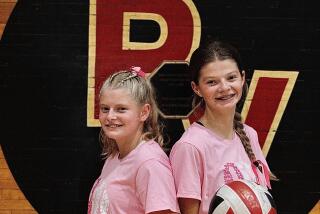FAMILY TIES : Brother and Sister Team in Tennis Game of Love--Except During Practice
- Share via
SAN DIEGO — Coaches are chided and players rebuked for the outcome that sometimes seems despised more and accepted less than a loss. The dreaded, avoid-at-all-costs, tie .
“It’s like kissing your sister,” comes the standard reply.
A charge that Jon Elsberry would like to address.
Elsberry, a sophomore at La Jolla High School, and sister Branaca, a senior at Bishop’s School, have only played competitive mixed doubles in a handful of tournaments, but have already made a ritual of hugging and kissing before and after every match.
“It’s to show our love,” said Jon, 15. “Even if we lose, it’s to show that we still love each other. It’s not just if we win.”
Which they do. Last month, Branaca, 17, and Jon teamed to win the brother-sister doubles championship of the Equitable Family Tennis Challenge in Flushing Meadows, N.Y., played in conjunction with the U.S. Open.
“I didn’t expect it from Jon at first,” said Branaca of the affectionate gesture. “I mean, I didn’t see anyone else doing it.”
Probably because most other sister-brother tandems are too busy brawling.
“Last year,” Jon said, “the team that won fought all the time, but it ended up bringing them closer together.”
The product of a tight-knit family, Jon and Branaca get along splendidly, as long as they’re competing with, not against, each other.
“In matches, if we fight, we’ll lose,” said Branaca. “We see it happen all the time. You have to support each other.”
Lee Merry of Tennis Escondido has coached both Elsberrys for almost two years. Merry has tried to get them to practice together, but he abandoned the mission because of their incessant bickering.
“It’s like night and day,” Merry said. “In practice, the normal sister-brother stuff happens, only 10 times what it usually is. But over on the (competitive) side, it’s a different story. They seem to get a real enjoyment out of playing with each other.”
Said Jon: “Most everyone else is in fights. We’re like that in practice, but it’s different in a tournament.”
Especially a national tournament, where Branaca appears regularly, but where Jon is still getting his feet wet and his racquet back.
“Branaca plays (national tournaments) all the time, and Jon’s only played two,” said Judy Elsberry, the players’ mother. “This meant more to Jon, he really wanted it.”
The Elsberrys won local and regional tournaments to advance to the round of 16 in New York, and although the final was relatively anticlimactic--they breezed past a team from Hawaii, 6-3, 6-0--winning with relatives wasn’t.
“It’s neat if you can do it as a family,” said Branaca, the seventh-ranked girls’ 18-and-under singles player in Southern California. “It’s not like you’re playing with some stranger off the street, someone who doesn’t understand you.”
And since some stranger off the street isn’t likely to share a ride home and eat at the same dinner table, the desire to win is as strong as ever.
“You take it seriously because you don’t want to let the other person down,” she said. “With most doubles partners, you play and then you won’t see them for a week. It’s different when it’s your brother, you see him all the time and it reminds you of the match.”
Although Jon has had success with current partner James Conda--they were second-ranked in 14-under boys’ doubles in Southern California last year--he still sees family ties as a buffer from the wrath of a partner.
“I like that she understands me and won’t hold a grudge if I miss a shot,” Jon said.
But with their contrasting styles of play--Branaca is consistent, Jon showy--tempers invariably flair.
“Sometimes he’s showy just for fun,” Branaca protested. “He seems to forget that it counts. The between-the-legs shot, that’s the one that bothers me the most. I’ve never seen him make it.”
Jon, offering a defense: “But I get bored.”
And easily angered. But not so much anymore, thanks in part to Branaca’s influence.
“Branaca calms him down in the three-setters,” Judy Elsberry said. “He’s a fine player, but if he gets upset, that’s it. His emotions are more a struggle with him.”
A struggle he’s slowly overcoming. “I’ve improved a lot mentally, she’s helped me with that,” Jon said. “She showed me that if I get mad, we’ll lose.”
Jon, meanwhile, helps Branaca control her hard-hitting game.
“For a girl, Branaca hits the ball hard,” Judy said. “So Jon has to figure out a way to stop her from hitting the ball too hard sometimes.”
Branaca’s strength is such that in a match in New York, an opponent told his sister to always hit to the girl. Until they met the Elsberrys.
“I heard him pull his sister aside and say, ‘Not to that girl,’ ” Branaca said.
Almost in spite of themselves, they have discovered the perfect balance on the court.
“They bring out the best in each other,” Merry said. “Jon had pretty highs and lows and Branaca helps to steady him out. But he pumps her up, too.”
Merry said both are successful singles players, aggressive and not intimidated, “but they’re both hot and cold,” he said. “We’re working on more consistency. Fortunately, when they get together, it seems to work for them.”
Also working in their favor is their understanding of doubles. Jon and Branaca were raised on the game.
“They’ve played a lot, and they’re good at it,” Judy said. “More college coaches these days are looking at doubles players now because they know how important they are to winning matches.”
According to Merry, their background in doubles has been a tremendous asset.
“That’s one of the biggest factors that has helped them,” he said. “They know how to play and that kind of experience gives them a lot of confidence.”
Said Branaca: “Most players begin learning the singles game and then play doubles later. They don’t know how to play the whole court. Just because there are two people on the court doesn’t mean doubles is that easy.”
There are few opportunities for brother-sister teams to play against top competition, but Jon and Branaca hope to play together, someday, for a Grand Slam title.
“That would be the ultimate,” Branaca said, “if we came back (to New York) and won the U.S. Open.”
More to Read
Go beyond the scoreboard
Get the latest on L.A.'s teams in the daily Sports Report newsletter.
You may occasionally receive promotional content from the Los Angeles Times.










